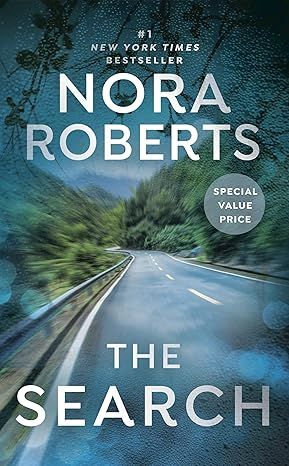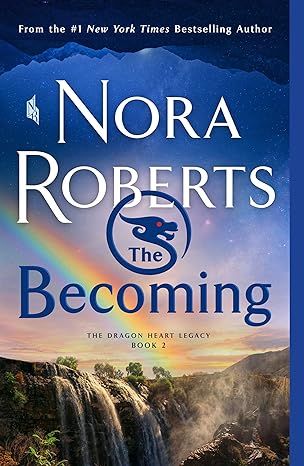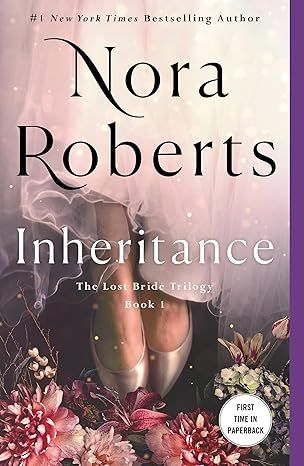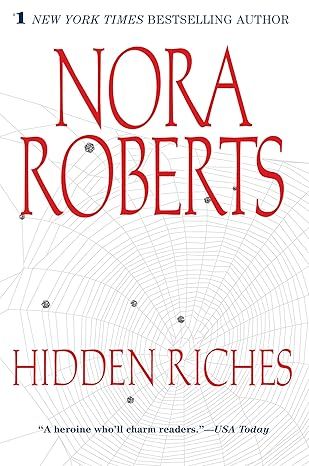Hidden Riches
4.6
-
9,512 ratings
#1 New York Times bestselling author Nora Roberts unveils the intriguing world of antiques dealing, where an independent woman discovers the price of breathless desire—and the schemes of an obsessed killer…
Dora Conroy has a passion for antiques—and any other rarities she can acquire for her quaint Philadelphia shop. A seasoned dealer, she knows all the tricks of the trade. But she is unprepared for the deadly consequences when she purchases a few curiosities at an auction—and unknowingly brings home a priceless cache that makes her the target of an international criminal. Entwined in a reckless chase, Dora turns to her new neighbor, Jed Skimmerhorn, a cop who’s turned in his badge—and whose desire for lovely Dora puts him back in the line of fire. Fighting their attraction while falling in love, they find that hidden riches can have a most ordinary façade. And that possession can be a lethal obsession…
Kindle
$2.99
Available instantly
Audiobook
$0.00
with membership trial
Hardcover
$21.49
Paperback
$13.97
Ships from
Amazon.com
Payment
Secure transaction
ISBN-10
0425197220
ISBN-13
978-0425197226
Print length
400 pages
Language
English
Publisher
Berkley
Publication date
July 05, 2004
Dimensions
6.03 x 1.1 x 9 inches
Item weight
1 pounds
Product details
ASIN :
B000OIZU62
File size :
2571 KB
Text-to-speech :
Enabled
Screen reader :
Supported
Enhanced typesetting :
Enabled
X-Ray :
Enabled
Word wise :
Enabled
Editorial reviews
“A heroine who’ll charm readers.”—USA Today
“[Roberts] delivers the goods with panache and wit.”—Publishers Weekly
“A sure winner.”—Library Journal
“Roberts keeps us sensuously engrossed in a suspenseful romance.”—Kirkus Reviews
Sample
PROLOGUE
He didn’t want to be there. No, he hated being trapped in the elegant old house, prodded and pinched by restless ghosts. It was no longer enough to shroud the furniture in dustcovers, lock the doors and walk away. He had to empty it and, by emptying it, purge himself of some of the nightmares.
“Captain Skimmerhorn?”
Jed tensed at the title. As of last week he was no longer captain. He’d resigned from the force, turned in his shield, but he was already weary of explaining it. He shifted aside as two of the movers carried a rosewood armoire down the staircase, through the grand foyer and out into the chilly morning.
“Yes?”
“You might want to check upstairs, make sure we got everything you wanted put in storage. Otherwise, looks like we’re all done here.”
“Fine.”
But he didn’t want to go up those stairs, walk through those rooms. Even empty they would hold too much. Responsibility, he mused as he reluctantly started up. His life had been too crowded with responsibility to ignore one now.
Something nudged him along the hallway toward his old room. The room where he had grown up, the room he had continued to inhabit long after he’d lived here alone. But he stopped in the doorway just short of crossing the threshold. Hands jammed into tight fists in his pockets, he waited for memories to assault him like sniper fire.
He’d cried in that room—in secret and in shame, of course. No Skimmerhorn male ever revealed a weakness in public. Then, when tears had dried, he’d plotted in that room. Small, useless childish revenges that had always boomeranged back on him.
He’d learned to hate in that room.
Yet it was only a room. It was only a house. He’d convinced himself of that years before when he had come back to live there as a man. And hadn’t he been content? he asked himself now. Hadn’t it been simple?
Until Elaine.
“Jedidiah.”
He flinched. He’d nearly brought his right hand out of his pocket to touch a weapon that was no longer there before he caught himself. The gesture, and the fact that he’d been so lost in his own morbid thoughts that someone could have come up behind him, reminded him why the weapon no longer hung at his side.
He relaxed and glanced back at his grandmother. Honoria Skimmerhorn Rodgers was neatly wrapped in mink, discreet daytime diamonds winking at her ears, her snowy hair beautifully coiffed. She looked like a successful matron on her way out for lunch at her favorite club. But her eyes, as vivid a blue as his own, were filled with concern.
“I’d hoped I’d convinced you to wait,” she said quietly, and reached out to lay a hand on his arm.
He flinched automatically. The Skimmerhorns simply weren’t touchers. “There was no reason to wait.”
“But there’s a reason for this?” She gestured toward the empty room. “There’s a reason to empty out your home, to put aside all of your belongings?”
“Nothing in this house belongs to me.”
“That’s absurd.” The faint whisper of her native Boston crept into her tone.
“By default?” He turned his back on the room to face her. “Because I happen to still be alive? No, thanks.”
If she hadn’t been so worried about him, the curt answer would have earned him a ringing reprimand. “My dear, there’s no question of default. Or any kind of fault.” She watched him close in, shut off, and would have shaken him if it would have helped. Instead, she touched his cheek. “You only need some time.”
The gesture left his muscles taut. It took all of his willpower not to jerk away from the gentle fingers. “And this is my way of taking it.”
“By moving out of the family home?”
“Family?” He laughed at that, and the sound of it echoed nastily down the hall. “We were never a family here, or anywhere.”
Her eyes, previously soft with sympathy, hardened. “Pretending the past doesn’t exist is as bad as living in it. What are you doing here? Tossing away everything you’ve earned, everything you’ve made of yourself? Perhaps I was less than enthusiastic about your choice of profession, but it was your choice and you succeeded. It appears to me that you made more of the Skimmerhorn name when you were promoted to captain than all your ancestors did with their money and social power.”
“I didn’t become a cop to promote my damn name.”
“No,” she said quietly. “You did it for yourself against tremendous family pressure—including my own.” She moved away from him to walk down the hall. She had lived here once, years before as a bride. An unhappy one. “I saw you turn your life around, and it awed me. Because I knew you did it for no one but yourself. I often wondered how you were strong enough to do that.”
Turning back, she studied him, this son of her son. He had inherited the bold good looks of the Skimmerhorns. Bronzed hair, tousled by the wind, swept around a lean, rawboned face that was taut with stress. She worried, woman-like, because he had lost weight, though the fining down of his features only heightened their power. There was strength in the tall, broad-shouldered build that both accented and defied the romantic masculine beauty of pale gold skin and sensitive mouth. The eyes, a deep striking blue, had come from her. They were as haunted and defiant now as they had been in the young, troubled boy she remembered so well.
But he was no longer a boy, and she was afraid there was little she could do to help the man.
“I don’t want to see you turn your life around again, for the wrong reasons.” She shook her head, walking back toward him before he could speak. “And I might have had reservations when you moved back in here alone after your parents died, but that, too, was your choice. And for some time, it seemed you’d made the right one again. But this time your solution to a tragedy is to sell your home, throw away your career?”
He waited a beat. “Yes.”
“You disappoint me, Jedidiah.”
That stung. It was a phrase she rarely used, and had more bite than a dozen of his father’s raging insults. “I’d rather disappoint you than be responsible for the life of a single cop. I’m in no shape to command.” He looked down at his hands, flexed them. “I may never be. And as for the house, it should have been sold years ago. After the accident. It would have been sold if Elaine had agreed to it.” Something backed up in his throat. Guilt was as bitter as bile. “Now she’s gone too, and it’s my decision.”
“Yes, it’s yours,” she agreed. “But it’s the wrong one.”
Rage sizzled in his blood. He wanted to hit something, someone, pound his fists into flesh. It was a feeling that came over him all too often. And because of it, he was no longer Captain J. T. Skimmerhorn of the Philadelphia Police Department, but a civilian.
“Can’t you understand? I can’t live here. I can’t sleep here. I need to get the hell out. I’m smothering here.”
“Then come home with me. For the holidays. At least until after the first of the year. Give yourself a little more time before you do something irreversible.” Her voice was gentle again as she took his rigid hands in hers. “Jedidiah, it’s been months since Elaine—since Elaine was killed.”
“I know how long it’s been.” Yes, he knew the exact moment of his sister’s death. After all, he’d killed her. “I appreciate the invitation, but I’ve got plans. I’m looking at an apartment later today. Over on South Street.”
“An apartment.” Honoria’s sigh was ripe with annoyance. “Really, Jedidiah, there’s no need for that kind of nonsense. Buy yourself another house if you must, take a long vacation, but don’t bury yourself in some miserable room.”
He was surprised he could smile. “The ad said it was quiet, attractive and well located. That doesn’t sound miserable. Grandmother”—he squeezed her hands before she could argue—“let it be.”
She sighed again, tasting defeat. “I only want what’s best for you.”
“You always did.” He suppressed a shudder, feeling the walls closing in on him. “Let’s get out of here.”
CHAPTER ONE
A theater without an audience has its own peculiar magic. The magic of possibilities. The echoing voices of actors running lines, the light cues, the costumes, the nervous energy and vaulting egos that bound from center stage to the empty back row.
Isadora Conroy absorbed the theater’s magic as she stood in the wings of the Liberty Theater, watching a dress rehearsal for A Christmas Carol. As always, she enjoyed the drama, not only Dickens, but also the drama of edgy nerves, of creative lighting, of the well-delivered line. After all, the theater was in her blood.
There was a vibrancy that pulsed from her even in repose. Her large brown eyes glinted with excitement and seemed to dominate the face framed by a swing of golden-brown hair. That excitement brought a flush to ivory skin, a smile to her wide mouth. It was a face of subtle angles and smooth curves, caught between wholesome and lovely. The energy inside her small, compact body shimmered out.
She was a woman interested in everything around her, who believed in illusions. Watching her father rattling Marley’s chains and intoning dire predictions to the fear-struck Scrooge, she believed in ghosts. And because she believed, he was no longer her father, but the doomed miser wrapped for eternity in the heavy chains of his own greed.
Then Marley became Quentin Conroy again, veteran actor, director and theater buff, calling for a minute change in the blocking.
“Dora.” Hurrying up from behind, Dora’s sister, Ophelia, said, “We’re already twenty minutes behind schedule.”
“We don’t have a schedule,” Dora murmured, nodding because the blocking change was perfect. “I never have a schedule on a buying trip. Isn’t he wonderful, Lea?”
Though her sense of organization was hampered, Lea glanced out onstage and studied their father. “Yes. Though God knows how he can stand to put on this same production year after year.”
“Tradition.” Dora beamed. “The theater’s rooted in it.” Leaving the stage hadn’t diminished her love of it, or her admiration for the man who had taught her how to milk a line. She’d watched him become hundreds of men onstage. Macbeth, Willie Loman, Nathan Detroit. She’d seen him triumph and seen him bomb. But he always entertained.
“Remember Mom and Dad as Titania and Oberon?”
Lea rolled her eyes, but she was smiling. “Who could forget? Mom stayed in character for weeks. It wasn’t easy living with the queen of the fairies. And if we don’t get out of here soon, the queen’s going to come out and run through her list of what might happen to two women traveling alone to Virginia.”
Sensing her sister’s nerves and impatience, Dora swung an arm around Lea’s shoulders. “Relax, honey, I’ve got her covered, and he’s going to take five in a minute.”
Which he did, on cue. When the actors scattered, Dora stepped out to center stage. “Dad.” She took a long look, skimming down from the top of his head to his feet. “You were great.”
“Thank you, my sweet.” He lifted an arm so that his tattered shroud floated. “I think the makeup is an improvement over last year.”
“Absolutely.” In fact, the greasepaint and charcoal were alarmingly realistic; his handsome face appeared just short of decay. “Absolutely gruesome.” She kissed him lightly on the lips, careful not to smudge. “Sorry we’ll miss opening night.”
“Can’t be helped.” Though he did pout just a little. Although he had a son to carry on the Conroy tradition, he’d lost his two daughters, one to marriage, one to free enterprise. Then again, he did occasionally shanghai them into a minor role. “So, my two little girls are off on their adventure.”
“It’s a buying trip, Dad, not a trip to the Amazon.”
“Just the same.” He winked and kissed Lea in turn. “Watch out for snakes.”
“Oh, Lea!” Trixie Conroy, resplendent in her costume complete with bustle and feathered hat, rushed out onstage. The Liberty’s excellent acoustics carried her throaty voice to the rear balcony. “John’s on the phone, dear. He couldn’t remember if Missy had a scout meeting tonight at five, or a piano lesson at six.”
“I left a list,” Lea muttered. “How’s he going to manage the kids for three days if he can’t read a list?”
“Such a sweet man,” Trixie commented when Lea dashed off. “The perfect son-in-law. Now, Dora, you will drive carefully?”
“Yes, Mom.”
“Of course you will. You’re always careful. You won’t pick up any hitchhikers?”
“Not even if they beg.”
“And you’ll stop every two hours to rest your eyes?”
“Like clockwork.”
An inveterate worrier, Trixie gnawed on her bottom lip. “Still, it’s an awfully long way to Virginia. And it might snow.”
“I have snow tires.” To forestall more speculation, Dora gave her mother another kiss. “There’s a phone in the van, Mom. I’ll check in every time we cross a state line.”
“Won’t that be fun?” The idea cheered Trixie enormously. “Oh, and Quentin, darling, I’ve just come from the box office.” She gave her husband a deep curtsy. “We’re sold out for the week.”
“Naturally.” Quentin lifted his wife to her feet and twirled her in a graceful spin that ended in a deep dip. “A Conroy expects nothing less than standing room only.”
“Break a leg.” Dora kissed her mother one last time. “You too,” she said to Quentin. “And Dad, don’t forget you’re showing the apartment later today.”
“I never forget an engagement. Places!” he called out, then winked at his daughter. “Bon voyage, my sweet.”
Dora could hear his chains clanging when she hit the wings. She couldn’t imagine a better send-off.
To Dora’s way of thinking, an auction house was very like a theater. You had the stage, the props, the characters. As she had explained to her baffled parents years before, she wasn’t really retiring from the stage. She was merely exploring another medium. She certainly put her actor’s blood to good use whenever it was time to buy or sell.
She’d already taken the time to study the arena for today’s performance. The building where Sherman Porter held his auctions and ran a daily flea market had originally been a slaughterhouse and was still as drafty as a barn. Merchandise was displayed on an icy concrete floor where cows and pigs had once mooed and squealed on their way to becoming pot roasts and pork chops. Now humans, huddled in coats and mufflers, wandered through, poking at glassware, grunting over paintings and debating over china cabinets and carved headboards.
The ambience was a bit thin, but she’d played in less auspicious surroundings. And, of course, there was the bottom line.
Isadora Conroy loved a bargain. The words “On Sale” sent a silvery tingle through her blood. She’d always loved to buy, finding the basic transaction of money for objects deeply satisfying. So satisfying that she had all too often exchanged money for objects she had no use for. But it was that love of a bargain that had guided Dora into opening her own shop, and the subsequent discovery that selling was as pleasurable as buying.
“Lea, look at this.” Dora turned to her sister, offering a gilded cream dispenser shaped like a woman’s evening shoe. “Isn’t it fabulous?”
Ophelia Conroy Bradshaw took one look, lifted a single honey-brown eyebrow. Despite the dreamy name, this was a woman rooted in reality. “I think you mean frivolous, right?”
“Come on, look beyond the obvious aesthetics.” Beaming, Dora ran a fingertip over the arch of the shoe. “There’s a place for ridiculous in the world.”
“I know. Your shop.”
Dora chuckled, unoffended. Though she replaced the creamer, she’d already decided to bid on that lot. She took out a notebook and a pen that boasted a guitar-wielding Elvis to note down the number. “I’m really glad you came along with me on this trip, Lea. You keep me centered.”
“Somebody has to.” Lea’s attention was caught by a colorful display of Depression glass. There were two or three pieces in amber that would add nicely to her own collection. “Still, I feel guilty being away from home this close to Christmas. Leaving John with the kids that way.”
“You were dying to get away from the kids,” Dora reminded her as she inspected a lady’s cherrywood vanity.
“I know. That’s why I’m guilty.”
“Guilt’s a good thing.” Tossing one end of her red muffler over her shoulder, Dora crouched down to check the work on the vanity’s brass handles. “Honey, it’s only been three days. We’re practically on our way back. You’ll get home tonight and smother the kids with attention, seduce John, and everybody’ll be happy.”
Lea rolled her eyes and smiled weakly at the couple standing beside her. “Trust you to take everything down to the lowest common denominator.”
With a satisfied grunt, Dora straightened, shook her chin-length sweep of hair away from her face and nodded. “I think I’ve seen enough for now.”
When she checked her watch, she realized it was curtain time for the matinee performance back home. Well, she mused, there was show business, and there was show business. She all but rubbed her hands together in anticipation of the auction opening.
“We’d better get some seats before they—oh wait!” Her brown eyes brightened. “Look at that.”
Even as Lea turned, Dora was scurrying across the concrete floor.
It was the painting that had caught her attention. It wasn’t large, perhaps eighteen by twenty-four inches with a simple, streamlined ebony frame. The canvas itself was a wash of color, streaks and streams of crimson and sapphire, a dollop of citrine, a bold dash of emerald. What Dora saw was energy and verve, as irresistible to her as a red-tag special.
Dora smiled at the boy who was propping the painting against the wall. “You’ve got it upside down.”
“Huh?” The stock boy turned and flushed. He was seventeen, and the sight of Dora smiling at him reduced him to a puddle of hormones. “Ah, no, ma’am.” His Adam’s apple bobbed frantically as he turned the canvas around to show Dora the hook at the back.
“Mmm.” When she owned it—and she certainly would by the end of the afternoon—she would fix that.
“This, ah, shipment just came in.”
“I see.” She stepped closer. “Some interesting pieces,” she said, and picked up a statue of a sad-eyed basset hound curled up in a resting pose. It was heavier than she’d expected, and pursing her lips, she turned it over and over for a closer inspection. No craftsman’s mark or date, she mused. But still, the workmanship was excellent.
“Frivolous enough for you?” Lea asked.
“Just. Make a terrific doorstop.” After setting it down she reached for a tall figurine of a man and woman in antebellum dress caught in the swirl of a waltz. Dora’s hand closed over thick, gnarled fingers. “Sorry.” She glanced up at an elderly, bespeckled man who gave her a creaky bow.
“Pretty, isn’t it?” he asked her. “My wife had one just like it. Got busted when the kids were wrestling in the parlor.” He grinned, showing teeth too white and straight to be God-given. He wore a red bow tie and smelled like a peppermint stick. Dora smiled back.
“Do you collect?”
“In a manner of speaking.” He set the figurine down and his old, shrewd eyes swept the display, pricing, cataloguing, dismissing. “I’m Tom Ashworth. Got a shop here in Front Royal.” He took a business card from his breast pocket and offered it to Dora. “Accumulated so much stuff over the years, it was open a shop or buy a bigger house.”
“I know what you mean. I’m Dora Conroy.” She held out a hand and had it enveloped in a brief arthritic grip. “I have a shop in Philadelphia.”
“Thought you were a pro.” Pleased, he winked. “Noticed you right off. Don’t believe I’ve seen you at one of Porter’s auctions before.”
“No, I’ve never been able to make it. Actually, this trip was an impulse. I dragged my sister along. Lea, Tom Ashworth.”
“Nice to meet you.”
“My pleasure.” Ashworth patted Lea’s chilled hand. “Never does warm up in here this time of year. Guess Porter figures the bidding’ll heat things up some.”
“I hope he’s right.” Lea’s toes felt frozen inside her suede boots. “Have you been in business long, Mr. Ashworth?”
“Nigh onto forty years. The wife got us started, crocheting doilies and scarves and what-all and selling them. Added some trinkets and worked out of the garage.” He took a corncob pipe from his pocket and clamped it between his teeth. “Nineteen sixty-three we had more stock than we could handle and rented us a shop in town. Worked side by side till she passed on in the spring of eighty-six. Now I got me a grandson working with me. Got a lot of fancy ideas, but he’s a good boy.”
“Family businesses are the best,” Dora said. “Lea’s just started working part-time at the shop.”
“Lord knows why.” Lea dipped her chilly hands into her coat pockets. “I don’t know anything about antiques or collectibles.”
“You just have to figure out what people want,” Ashworth told her, and flicked a thumbnail over a wooden match to light it. “And how much they’ll pay for it,” he added before he puffed the pipe into life.
“Exactly.” Delighted with him, Dora hooked a hand through his arm. “It looks like we’re getting started. Why don’t we go find some seats?”
Ashworth offered Lea his other arm and, feeling like the cock of the walk, escorted the women to chairs near the front row.
Dora pulled out her notebook and prepared to play her favorite role.
The bidding was low, but certainly energetic. Voices bounced off the high ceiling as the lots were announced. But it was the murmuring crowd that fired Dora’s blood. There were bargains to be had here, and she was determined to grab her share.
She outbid a thin, waiflike woman with a pinched mouth for the cherrywood vanity, snapped up the lot that included the creamer/slipper for a song and competed briskly with Ashworth for a set of crystal saltcellars.
“Got me,” he said when Dora topped his bid yet again. “You’re liable to get a bit more for them up north.”
“I’ve got a customer who collects,” Dora told him. And who would pay double the purchase price, she thought.
“That so?” Ashworth leaned closer as the bidding began on the next lot. “I’ve got a set of six at the shop. Cobalt and silver.”
“Really?”
“You got time, you drop on by after this and take a look.”
“I might just do that. Lea, you bid on the Depression glass.”
“Me?” Horror in her eyes, Lea gaped at her sister.
“Sure. Get your feet wet.” Grinning, Dora tilted her head toward Ashworth’s. “Watch this.”
As Dora expected, Lea started out with hesitant bids that barely carried to the auctioneer. Then she began to inch forward in her seat. Her eyes glazed over. By the time the lot was sold, she was snapping out her bid like a drill sergeant commanding recruits.
“Isn’t she great?” All pride, Dora swung an arm over Lea’s shoulders to squeeze. “She was always a quick study. It’s the Conroy blood.”
“I bought all of it.” Lea pressed a hand to her speeding heart. “Oh God, I bought all of it. Why didn’t you stop me?”
“When you were having such a good time?”
“But—but—” As the adrenaline drained, Lea slumped in her chair. “That was hundreds of dollars. Hundreds.”
“Well spent, too. Now, here we go.” Spotting the abstract painting, Dora rubbed her hands together. “Mine,” she said softly.
By three o’clock Dora was adding half a dozen cobalt saltcellars to the treasures in her van. The wind had kicked up, stinging color into her cheeks and sneaking down the collar of her coat.
“Smells like snow,” Ashworth commented. He stood on the curb in front of his shop and, with his pipe clenched in his hand, sniffed the air. “Could be you’ll run into some before you get home.”
“I hope so.” Pushing back her flying hair, she smiled at him. “What’s Christmas without it? It was great meeting you, Mr. Ashworth.” She offered her hand again. “If you get up to Philadelphia, I’ll expect you to drop by.”
“You can count on it.” He patted his pocket where he’d slipped her business card. “You two ladies take care of yourselves. Drive safely.”
“We will. Merry Christmas.”
“Same to you,” Ashworth added as Dora climbed in the van.
With a last wave she started the van and pulled away from the curb. Her eyes flicked up to the rearview mirror and she smiled as she saw Ashworth standing on the sidewalk with his pipe in his teeth and his hand lifted in a farewell salute. “What a sweetheart. I’m glad he got that figurine.”
Lea shivered and waited impatiently for the van to heat. “I hope he didn’t overcharge you for those saltcellars.”
“Mmm. He made a profit, I’ll make a profit and Mrs. O’Malley will add to her collection. Everybody gets what they want.”
“I guess. I still can’t believe you bought that hideous painting. You’ll never be able to sell it.”
“Oh, eventually.”
“At least you only paid fifty dollars for it.”
“Fifty-two seventy-five,” Dora corrected.
“Right.” Twisting in her seat, Lea looked at the boxes packed into the rear of the van. “You know, of course, that you don’t have room for all this junk.”
“I’ll make room. Don’t you think Missy would like that carousel?”
Lea imagined the outsize mechanical toy in her daughter’s pink-and-white bedroom and shuddered. “Please, no.”
“Okay.” Dora shrugged. Once she’d cleaned up the carousel, she might let it spin in her own living room for a while. “But I think she’d go for it. You want to call John and tell him we’re on our way back?”
“In a little while.” With a sigh, Lea settled back. “This time tomorrow, I’ll be baking cookies and rolling out pie dough.”
“You asked for it,” Dora reminded her. “You had to get married, have kids, buy a house. Where else is the family going to have Christmas dinner?”
“I wouldn’t mind if Mom didn’t insist on helping me cook it. I mean, the woman never cooked a real meal in her life, right?”
“Not that I remember.”
“And there she is, every Christmas, underfoot in my kitchen and waving around some recipe for alfalfa and chestnut dressing.”
“That one was bad,” Dora recalled. “But it was better than her curried potatoes and succotash casserole.”
“Don’t remind me. And Dad’s no help, wearing his Santa hat and hitting the eggnog before noon.”
“Maybe Will can distract her. Is he coming alone or with one of his sweeties?” Dora asked, referring to their brother’s list of glamorous dates.
“Alone, last I heard. Dora, watch that truck, will you?”
“I am.” In the spirit of competition, Dora gunned the engine and passed the sixteen-wheeler with inches to spare. “So when’s Will getting in?”
“He’s taking a late train out of New York on Christmas Eve.”
“Late enough to make a grand entrance,” Dora predicted. “Look, if he gets in your hair, I can always—oh, hell.”
“What?” Lea’s eyes sprang open.
“I just remembered, that new tenant Dad signed up is moving in across the hall today.”
“So?”
“I hope Dad remembers to be there with the keys. He was great about showing the apartment the last couple of weeks while I was tied up in the shop, but you know how absentminded he is when he’s in the middle of a production.”
“I know exactly how he is, which is why I can’t understand how you could let him interview a tenant for your building.”
“I didn’t have time,” Dora muttered, trying to calculate if she’d have an opportunity to call her father between performances. “Besides, Dad wanted to.”
“Just don’t be surprised if you end up across the hall from a psychopath, or a woman with three kids and a string of tattooed boyfriends.”
Dora’s lips curved. “I specifically told Dad no psychopaths or tattoos. I’m hoping it’s someone who cooks, and hopes to suck up to the landlord by bringing me baked goods on a regular basis. Speaking of which, do you want to eat?”
“Yeah. I might as well get in one last meal where I don’t have to cut up anyone’s food but my own.”
Dora swung toward the exit ramp, cutting off a Chevy. She ignored the angry blast of horns. There was a smile on her face as she imagined unpacking her new possessions. The very first thing she would do, she promised herself, was find the perfect spot for the painting.
High in the glittery tower of a silver building overlooking the cramped streets of LA, Edmund Finley enjoyed his weekly manicure. The wall directly across from his massive rosewood desk flickered with a dozen television screens. CNN, Headline News and one of the home-shopping networks all flashed silently across the wall. Other screens were tuned in to various offices in his organization so that he could observe his employees.
But unless he chose to listen in, the only sounds in the vast sweep of his office were the strains of a Mozart opera and the steady scrape of the manicurist’s nail file.
Finley liked to watch.
He’d chosen the top floor of this building so that his office would overlook the panorama of Los Angeles. It gave him the feeling of power, of omnipotence, and he would often stand for an hour at the wide window behind his desk and simply study the comings and goings of strangers far below.
In his home far up in the hills above the city, there were television screens and monitors in every room. And windows, again windows where he could look down on the lights of the LA basin. Every evening he would stand on the balcony outside his bedroom and imagine owning everything, everyone, for as far as his eye could see.
He was a man with an appetite for possessions. His office reflected his taste for the fine and the exclusive. Both walls and carpet were white, pure white to serve as a virgin backdrop for his treasures. A Ming vase graced a marble pedestal. Sculptures by Rodin and Denaecheau filled niches carved into the walls. A Renoir hung in a gold frame above a Louis Quatorze commode. A velvet settee reputed to have been Marie Antoinette’s was flanked by gleaming mahogany tables from Victorian England.
Two high glass cabinets held a stunning and esoteric display of objets d’art: carved snuff bottles of lapis and aquamarine, ivory netsukes, Dresden figurines, Limoges ring boxes, a fifteenth-century dagger with a jeweled handle, African masks.
Edmund Finley acquired. And once he acquired, he hoarded.
His import-export business was enormously successful. His smuggling sideline more so. After all, smuggling was more of a challenge. It required a certain finesse, a ruthless ingenuity and impeccable taste.
Finley, a tall, spare, distinguished-looking man in his early fifties, had begun to “acquire” merchandise as a youth working the docks in San Francisco. It had been a simple matter to misplace a crate, to open a trunk and to sell what he took. By his thirtieth year he had amassed enough capital to start his own company, enough savvy to play heavily on the dark side and win and enough contacts to ensure a steady flow of merchandise.
Now he was a wealthy man who preferred Italian suits, French women and Swiss francs. He could, after decades of transactions, afford to keep what appealed most to him. What appealed most was the old, the priceless.
“You’re all done, Mr. Finley.” The manicurist placed Finley’s hand gently on the spotless blotter on his desk. She knew he would check her work carefully while she packed up her tools and lotions. Once he had raged at her for ten minutes for missing a minute speck of cuticle on his thumb. But this time, when she dared to glance up, he was smiling down at his buffed nails.
“Excellent work.” Pleased, he rubbed his thumbs and fingertips together. Taking a gold money clip from his pocket, Finley peeled off a fifty. Then with one of his rare and disarming smiles, he added another hundred. “Merry Christmas, dear.”
“Oh—thank you. Thank you very much, Mr. Finley. Merry Christmas to you, too.”
Still smiling, he dismissed her with a wave of his buffed fingertips. His sporadic generosity came as naturally as his constant greed. He relished both. Before the door had closed behind her, he had swiveled in his chair, folded his hands over his silk vest. Through the stream of sunlight he studied his view of Los Angeles.
Christmas, he thought. What a lovely time of year. One of goodwill toward men, ringing bells and colored lights. Of course, it was also the time of desperate loneliness, despair and suicide. But those small human tragedies didn’t touch or concern him. Money had catapulted him above those fragile needs for companionship and family. He could buy companionship. He had chosen one of the richest cities in the world, where anything could be bought, sold, possessed. Here youth, wealth and power were admired above all else. During this brightest of holiday seasons, he had wealth, and he had power. As for youth, money could buy the illusion.
Finley scanned the buildings and sun-glinted windows with his bright green eyes. He realized with a vague sense of surprise that he was happy.
The knock on his office door made him turn as he called out, “Enter.”
“Sir.” Abel Winesap, a small, stoop-shouldered man with the heavy title of “Executive Assistant to the President,” cleared his throat. “Mr. Finley.”
“Do you know the true meaning of Christmas, Abel?” Finley’s voice was warm, like mulled brandy poured over cream.
“Ah . . .” Winesap fiddled with the knot of his tie. “Sir?”
“Acquisition. A lovely word, Abel. And the truest meaning of this delightful holiday, don’t you agree?”
“Yes, sir.” Winesap felt a shiver whisper down his spine. What he had come to report was difficult enough. Finley’s happy mood made the difficult more dangerous. “I’m afraid we have a problem, Mr. Finley.”
“Oh?” Finley’s smile remained, but his eyes frosted. “And what might that be?”
Winesap gulped in fear. He knew that Finley’s frigid anger was more lethal than another man’s rage. It had been Winesap who had been chosen to witness Finley’s termination of an employee who had been embezzling. And he remembered how calmly Finley had slit the man’s throat with a sixteenth-century jeweled dagger.
Betrayal, Finley believed, deserved quick punishment, and some ceremony.
Winesap also remembered, to his dismay, that it had been he who had been delegated to dispose of the body.
Nervously, he continued with his story. “The shipment from New York. The merchandise you were expecting.”
“Has there been a delay?”
“No—that is, in a manner of speaking. The shipment arrived today as expected, but the merchandise . . .” He moistened his thin, nervous lips. “It isn’t what you ordered, sir.”
Finley placed his pampered hands on the edge of the desk and the knuckles turned bone white. “I beg your pardon?”
“The merchandise, sir. It isn’t what was ordered. Apparently there was a mix-up somewhere.” Winesap’s voice petered out to a whimper. “I thought it best to report it to you at once.”
“Where is it?” Finley’s voice had lost its jovial warmth. It was a chilly hiss.
“In Receiving, sir. I thought—”
“Bring it up. Immediately.”
“Yes, sir. Right away.” Winesap escaped, grateful for the reprieve.
Finley had paid a great deal of money for the merchandise, and a great deal more to have that merchandise concealed and smuggled. Having each piece stolen, then disguised, transported from various locations to his factory in New York. Why, the bribes alone had run close to six figures.
To calm himself, he paused by a decanter of guava juice and poured generously.
And if there had been a mistake, he thought, steadier, it would be rectified. Whoever had erred would be punished.
Carefully, he set the Baccarat low-ball glass aside and studied himself in the oval George III mirror above the bar. He brushed a fussy hand over his thick mane of dark hair, admiring the glint and gleam of silver that threaded through it. His last face-lift had smoothed away the sags under his eyes, firmed his chin and erased the lines that had dug deeply around his mouth.
He looked no more than forty, Finley decided, turning his face from side to side to study and approve his profile.
What fool had said that money couldn’t buy happiness?
The knock on his door shattered his mood. “Come,” he snapped out, and waited as one of his receiving clerks wheeled in a crate. “Leave it there.” He jabbed a finger toward the center of the room. “And go. Abel, remain. The door,” he said, and Winesap scurried to shut it behind the departing clerk.
When Finley said nothing more, Winesap blanched and walked back to the crate. “I opened it as you instructed, Mr. Finley. As I began to inspect the merchandise, I realized there had been an error.” Gingerly he reached into the crate, dipping his hand into a sea of shredded paper. His fingers trembled as he pulled out a china teapot decorated with tiny violets.
Finley took the teapot, turning it over in his hands. It was English, a lovely piece, worth perhaps $200 on the open market. But it was mass-produced. Thousands of teapots exactly like this one were on sale across the world. So to him it was completely worthless. He smashed it against the edge of the crate and sent shards flying.
“What else?”
Quaking, Winesap plunged his hand deep into the crate and drew out a swirling glass vase.
Italian, Finley deduced as he inspected it. Handmade. A value of $100, perhaps $150. He hurled it, barely missing Winesap’s head, and sent it crashing against the wall.
“There’s—there’s teacups.” Winesap’s eyes darted to the crate and back to his employer’s stony face. “And some silver—two platters, a candy dish. A p-pair of crystal goblets etched with wedding bells.”
“Where is my merchandise?” Finley demanded, biting off each word.
“Sir, I can’t—that is, I believe there’s been . . .” His voice drained out to a whisper. “An error.”
“An error.” Finley’s eyes were like jade as he clenched his fists at his sides. DiCarlo, he thought, conjuring up an image of his man in New York. Young, bright, ambitious. But not stupid, Finley reminded himself. Not stupid enough to attempt a double cross. Still, he would have to pay, and pay dearly for this error.
“Get DiCarlo on the phone.”
“Yes, sir.” Relieved that Finley’s wrath was about to find a new target, Winesap darted to the desk to place the call.
As Winesap dialed, Finley crunched shards of china into the carpet. Reaching into the crate, he systematically destroyed the rest of the contents.
Read more
About the authors
Nora Roberts
Nora Roberts is the #1 New York Times bestselling author of more than 200 novels, including Shelter in Place, Year One, Come Sundown, and many more. She is also the author of the bestselling In Death series written under the pen name J.D. Robb. There are more than five hundred million copies of her books in print.
Reviews
Customer reviews
4.6 out of 5
9,512 global ratings
LovingRomance
5
Cops, antiques, murder, love. Just another very good Nora Roberts book.
Reviewed in the United States on March 12, 2018
Verified Purchase
First I have to like the characters in the book. The plot, however good it is, will not work unless I care about the characters. Except for the bad guys I really enjoyed every single character in this one. The heroine is an antique dealer who is perfectly comfortable in her own skin. She is not husband hunting, she’s just enjoying her life and her business. She owns the building where her business is downstairs and she has her apartment upstairs. There is another apartment which she rents out. Into this comes a very troubled, private man who somehow gets under her skin. He tries very hard to keep his distance but she is too lovable and too interesting and he can’t help himself. There are murderers and thievery, and she’s in the middle of it all. He is a cop first last and always but has quit his job because of his sister’s murder. Soon enough he becomes involved in the goings on in her business. He also meets her parents. They are actors and have their own company. She has one sister who is married and lives a “normal” life. Love creeps up on this couple but they nearly lose it because of a very evil man. All‘s well that ends well and this one does end very well.
Read more
10 people found this helpful
Lancene Blackmon
5
Funny, sexy, heartbreaking
Reviewed in the United States on April 3, 2023
Verified Purchase
I've just re-read this book and I was reminded why I loved it so much the first time. The banter between our protaganists, especially in the first half of the book, had me laughing out loud a few times - just classic Nora at her best. Heroine is everything you want her to be - plucky, smart, a little fiesty and emotionally brave. Hero is more problematic - he's got a lot of baggage, he's closed off, but he isn't immune to our girl's charms. WARNING - there is a violent and troublesome scene between H and h about half way through. It doesn't go too far, but it is upsetting for both heroine and reader. Personally, I think she forgave him way too fast - he suffered, but not enough. IRL this would have been way more concerning, but it is fiction and it didn't ruin the story for me-he owns up to his behavior which is helpful. One nitpick I have is that too much of the book is devoted to lengthy passages about the villain. I enjoyed our main characters so much that I ended up skimming through a lot of stuff about the bad guy so I could get back to Jed and Dora's story. One of my favorite Nora stories, and I've read A LOT of them.
Read more
6 people found this helpful
Huntress (I hunt books)
5
Humor, murder, robbery and romance make for an unforgettably good story.
Reviewed in the United States on June 26, 2013
Verified Purchase
Dora is a quick-witted, sharp, compassionate, savvy business, woman who loves what she does. She buys and sells antiques and collectible novelties which she purchases at auctions and estate sales. At the last sale she was at, she unknowingly purchases some items that were used to smuggle stolen merchandise inside them. As the thieves track down these items and retrieve them one by one, the robberies and the body counts start growing. While Dora was out buying, her father rented her apartment across from her to an ex-cop named Jed. Jed is attracted to Dora but does his best to ignore it. Dora, on the other hand, recognizes the interest he is trying to conceal and pushes her advantage by showing up around him frequently and ignoring his gruff, get lost behavior. Jed was not raised in a loving caring family style atmosphere. His parents fought constantly, usually publicly. He wants no part of a relationship. Dora is the opposite...raised in a loving, nose poking, but caring atmosphere. She is drawn to sexy Jed. They are drawn to one another but Jed tries to keep an imaginary wall erected between them. Dora's store is broken into while she and Jed are upstairs in their apartments. Jed and Dora get shot at when they try to catch the burglar. They start to realize that the break-ins, the robberies and the murders are all related to the items that she purchased. Time is running out. The last item is a painting and Dora has it. The thieves know it and plan to get it at all costs. The dry humor and quick wit in this book will keep you laughing. The suspense will keep you hanging on til the end. The spicy romance will warm up any cold night. A very good read.
Read more
11 people found this helpful
Top Nora Roberts titles
View all
Dance of Dreams
4.4
-
2,545
$7.99

The Search
4.6
-
17,581
$3.33

Whiskey Beach
4.5
-
29,392
$3.33

Hideaway
4.5
-
28,237
$1.93

Come Sundown: A Novel
4.5
-
28,396
$8.99

Identity
4.7
-
33,614
$11.98

Choice (The Dragon Heart Legacy, 3)
4.7
-
22,366
$12.99

Becoming (The Dragon Heart Legacy, 2)
4.7
-
26,424
$9.99

The Awakening: The Dragon Heart Legacy, Book 1 (The Dragon Heart Legacy, 1)
4.7
-
31,307
$9.55

Reflections (Bannion Family)
4.4
-
2,823
$7.99

Inheritance: The Lost Bride Trilogy, Book 1 (The Lost Bride Trilogy, 1)
4.7
-
22,046
$14.99

Mind Games: A Novel
4.7
-
12,513
$14.99
Similar Books
Best sellers
View all
The Tuscan Child
4.2
-
100,022
$8.39

The Thursday Murder Club: A Novel (A Thursday Murder Club Mystery)
4.3
-
155,575
$6.33

Sapiens: A Brief History of Humankind
4.6
-
140,302
$13.49

The Butterfly Garden (The Collector, 1)
4.3
-
88,556
$9.59

Things We Hide from the Light (Knockemout Series, 2)
4.4
-
94,890
$11.66

The Last Thing He Told Me: A Novel
4.3
-
154,085
$2.99

The Perfect Marriage: A Completely Gripping Psychological Suspense
4.3
-
143,196
$9.47

The Coworker
4.1
-
80,003
$13.48

First Lie Wins: A Novel (Random House Large Print)
4.3
-
54,062
$14.99

Mile High (Windy City Series Book 1)
4.4
-
59,745
$16.19

Layla
4.2
-
107,613
$8.99

The Locked Door
4.4
-
94,673
$8.53







